中考第一轮复习人教新目标九年级英语全册Unit 4-6词汇短语复习课件
文档属性
| 名称 | 中考第一轮复习人教新目标九年级英语全册Unit 4-6词汇短语复习课件 |
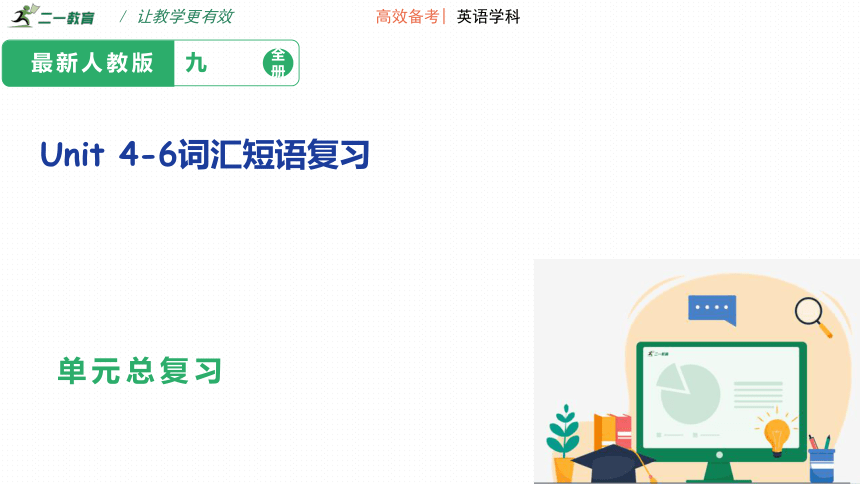
|
|
| 格式 | pptx | ||
| 文件大小 | 200.3KB | ||
| 资源类型 | 试卷 | ||
| 版本资源 | 人教新目标(Go for it)版 | ||
| 科目 | 英语 | ||
| 更新时间 | 2025-03-07 11:48:16 | ||
图片预览

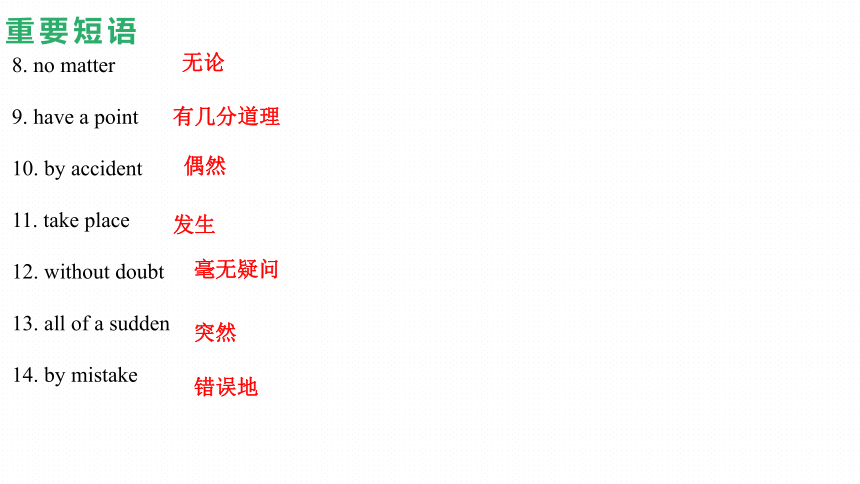
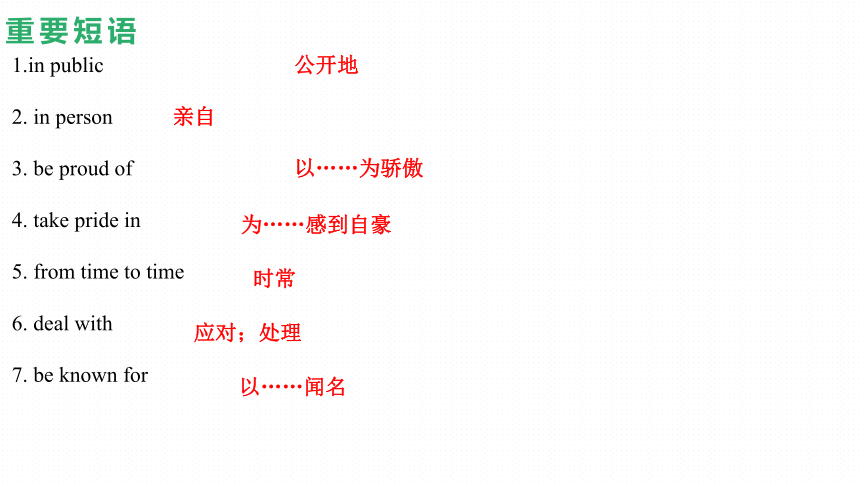
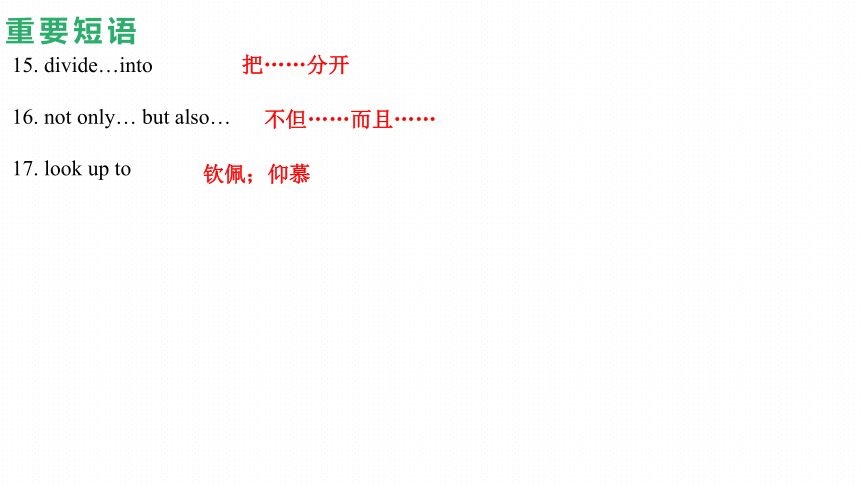
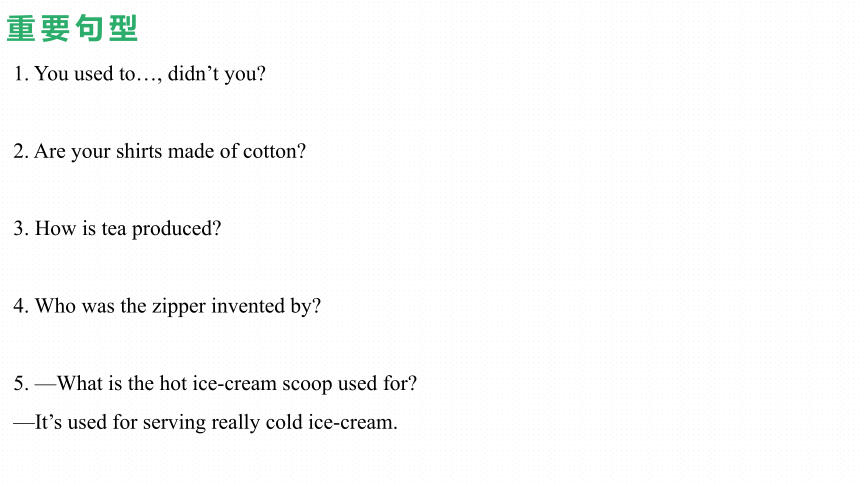

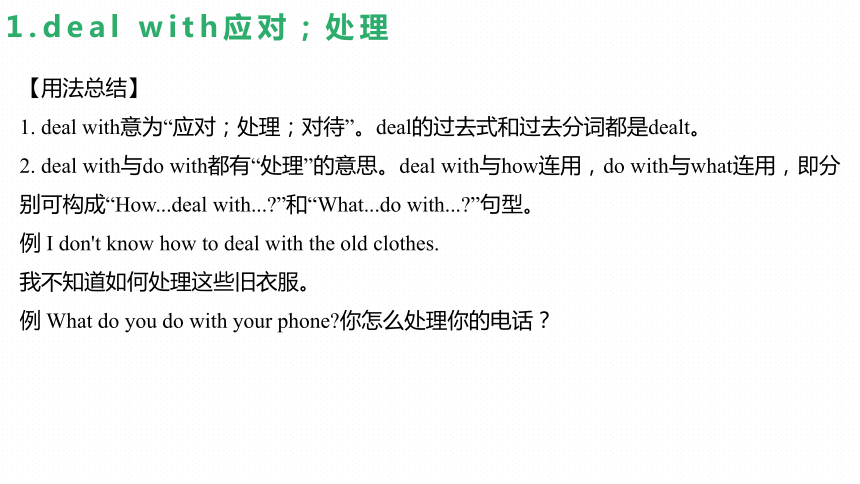
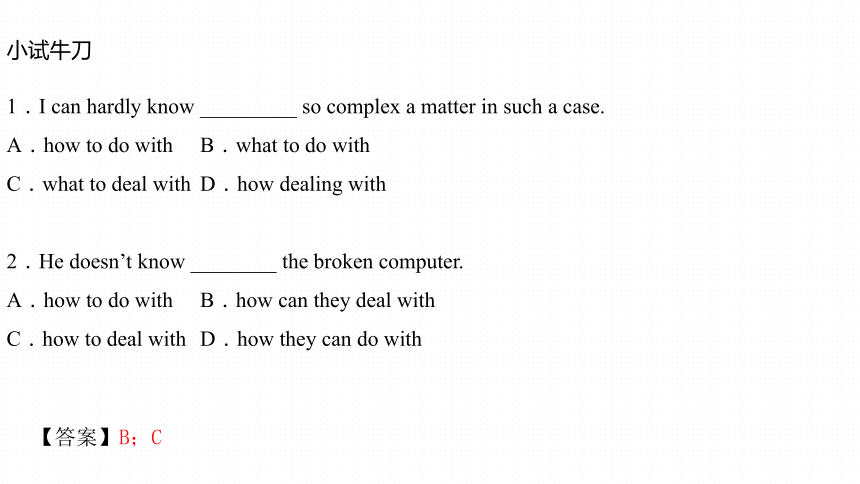
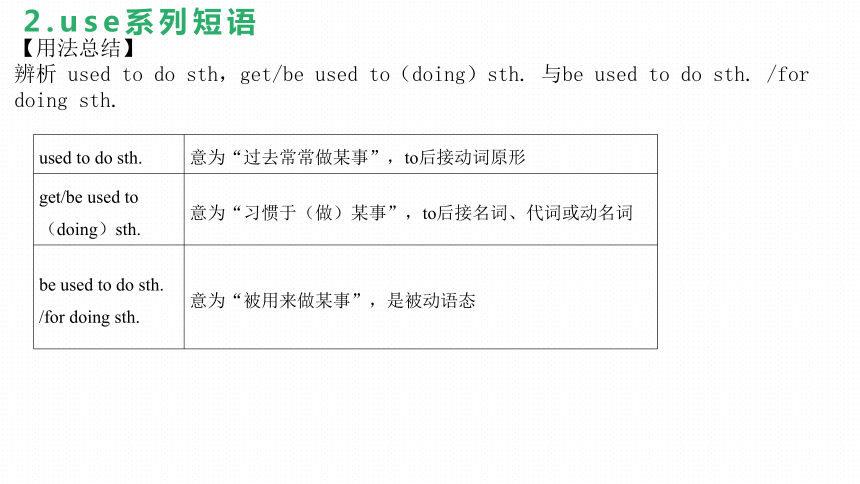
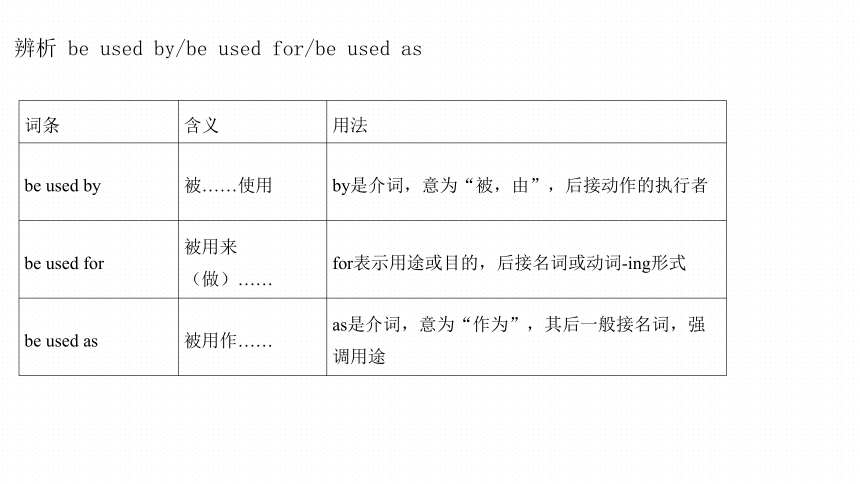
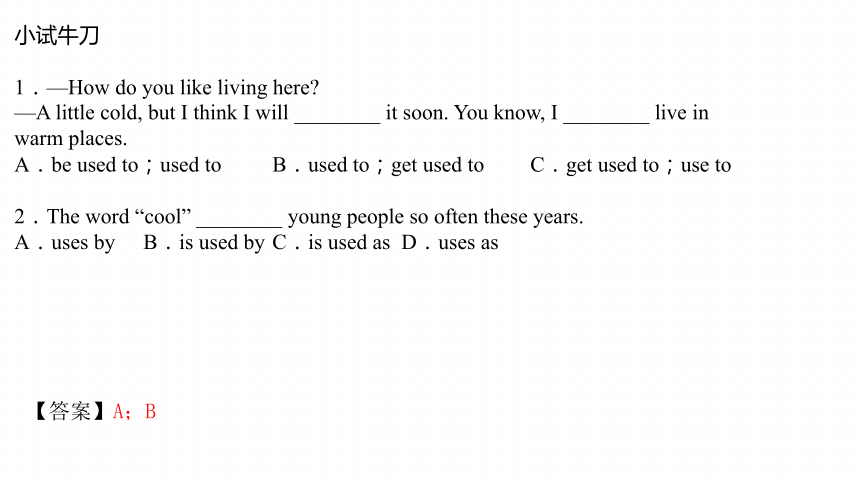
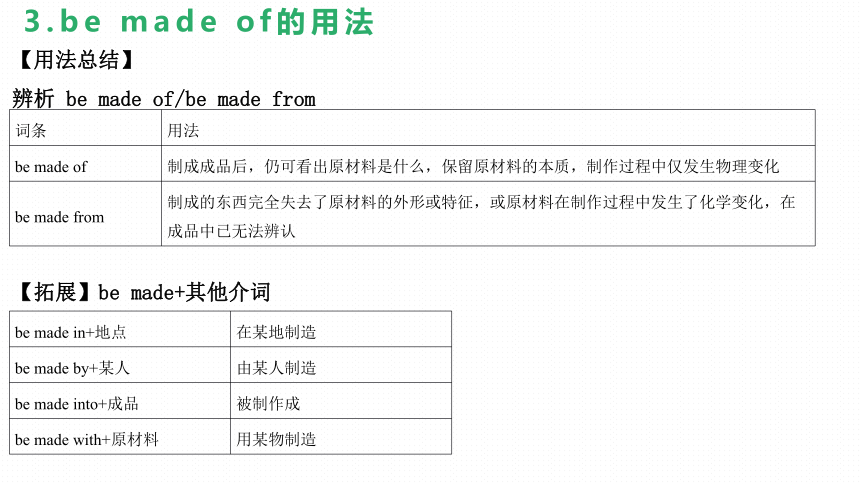
文档简介
(共33张PPT)
Unit 4-6词汇短语复习
九
最新人教版
全册
单元总复习
/ 让教学更有效 高效备考| 英语学科
8. no matter
9. have a point
10. by accident
11. take place
12. without doubt
13. all of a sudden
14. by mistake
重要短语
无论
有几分道理
偶然
毫无疑问
突然
发生
错误地
1.in public
2. in person
3. be proud of
4. take pride in
5. from time to time
6. deal with
7. be known for
重要短语
公开地
亲自
以……为骄傲
时常
应对;处理
为……感到自豪
以……闻名
15. divide…into
16. not only… but also…
17. look up to
重要短语
把……分开
不但……而且……
钦佩;仰慕
1. You used to…, didn’t you
2. Are your shirts made of cotton
3. How is tea produced
4. Who was the zipper invented by
5. —What is the hot ice-cream scoop used for
—It’s used for serving really cold ice-cream.
重要句型
Unit 4-6
语法汇集
九年级
最新人教版
全册
/ 让教学更有效 高效备考| 英语学科
1.deal with应对;处理
【用法总结】
1. deal with意为“应对;处理;对待”。deal的过去式和过去分词都是dealt。
2. deal with与do with都有“处理”的意思。deal with与how连用,do with与what连用,即分别可构成“How...deal with... ”和“What...do with... ”句型。
例 I don't know how to deal with the old clothes.
我不知道如何处理这些旧衣服。
例 What do you do with your phone 你怎么处理你的电话?
小试牛刀
1.I can hardly know _________ so complex a matter in such a case.
A.how to do with B.what to do with
C.what to deal with D.how dealing with
2.He doesn’t know ________ the broken computer.
A.how to do with B.how can they deal with
C.how to deal with D.how they can do with
【答案】B;C
2.use系列短语
【用法总结】
辨析 used to do sth,get/be used to(doing)sth. 与be used to do sth. /for doing sth.
used to do sth. 意为“过去常常做某事”,to后接动词原形
get/be used to(doing)sth. 意为“习惯于(做)某事”,to后接名词、代词或动名词
be used to do sth. /for doing sth. 意为“被用来做某事”,是被动语态
辨析 be used by/be used for/be used as
词条 含义 用法
be used by 被……使用 by是介词,意为“被,由”,后接动作的执行者
be used for 被用来(做)…… for表示用途或目的,后接名词或动词-ing形式
be used as 被用作…… as是介词,意为“作为”,其后一般接名词,强调用途
小试牛刀
1.—How do you like living here
—A little cold, but I think I will ________ it soon. You know, I ________ live in warm places.
A.be used to;used to B.used to;get used to C.get used to;use to
2.The word “cool” ________ young people so often these years.
A.uses by B.is used by C.is used as D.uses as
【答案】A;B
【用法总结】
辨析 be made of/be made from
【拓展】be made+其他介词
3.be made of的用法
词条 用法
be made of 制成成品后,仍可看出原材料是什么,保留原材料的本质,制作过程中仅发生物理变化
be made from 制成的东西完全失去了原材料的外形或特征,或原材料在制作过程中发生了化学变化,在成品中已无法辨认
be made in+地点 在某地制造
be made by+某人 由某人制造
be made into+成品 被制作成
be made with+原材料 用某物制造
【答案】B;D
1.Bob’s mother bought him a coat ________ cotton and it ________ China.
A.made of; made in B.made of; was made in
C.was made of; was made in D.was made of; made in
2.In China, ancient books ________ bamboo before paper was invented.
A.were made up of B.were made from
C.made of D.were made of
【用法总结】
辨析 pleasant/pleased/pleasure
例 Reading books can give us much pleasure.
读书能给我们带来许多乐趣。
4.pleasant adj.合意的;令人愉快的;讨人喜欢的
pleasant 形容词,意为“令人愉快的”,一般作定语修饰物;当主语是物时,也可作表语
pleased 形容词,意为“高兴的”,主语通常是人,常与be连用,后接介词at/with/by来连接名词,还可接动词不定式或that从句
pleasure 名词,表示“高兴,娱乐”时是不可数名词;表示“乐趣,高兴的事”时是可数名词
1.I have ________ in traveling. Last year I went to Hangzhou and had a ________ trip there.
A.interests; pleased B.interest; pleasant
C.interest; pleasing D.interests; pleasant
2.Jim is a pleasant and charming young man.
A.interested B.interesting
C.friendly D.knowledgeable
答案:B;C
【用法总结】
辨析 invent/discover/find/find out
5.invent v.发明,创造
动词 意义与用法
invent 意为“发明”,即“发明”出原来没有的东西
discover 意为“发现”,即“发现”某种本来存在而从前未被发现的事物或未被人所知的东西
find 指偶然发现或经过寻找才得到所需要的东西或丢失的东西
find out 通常表示“弄明白,搞清楚,查明”,其后常接疑问词引导的从句
练一练:
1.I ________ my pen everywhere, but I couldn’t ________ it. I want to ________ who took it.
A.looked for; find out; find B.looked for; find; find out
C.found; find out; look for D.found out; look for; find
2.He is a computer engineer. And he is trying to invent a new game now.
A.create B.operate C.play
【答案】B;A
6.require/r 'kwar (r)/.需要;要求 requirement n.需要;要求
require+n.需要某物;要求某事 require require sb.to do sth.要求某人做某事
require sth. of sb.要求某人某事 require that…(should)do....要求……
require sth. from sb.要求某人提供某物 require doing=require to be done需要被做
练一练:
1.What more do you require ________
A.me doing B.I should do C.me to do D.me to doing
2.—These days, our society calls on everyone to save electricity.
—Yes, so the shopping malls require ________ earlier than before.
A.closing B.close C.to close
【答案】C;A
【用法总结】
辨析 be known for/be known as
be known for=be famous for 以……闻名;因……为人知晓
be known as=be famous as作为……而著名
例 Guizhou is known for Huangguoshu Waterfall.
贵州因黄果树瀑布而闻名。
例 His grandfather was known as a brave seaman.
他的爷爷作为一名勇敢的水手而出名。
7.be known for/be known as
练一练
1.Hangzhou _______ the West Lake.
A.is famous for B.is known as
C.is different from D.is the same as
2.Peter is famous for his excellent English pronunciation in our school. We all admire him.
A.is worried about B.is afraid of
C.is known for D.is interested in
【答案】A ;C
【用法总结】
8.pride/pra d/n.自豪;骄傲
搭 take pride in为……感到自豪 a sense of pride自豪感
with pride自豪地 be the pride of sb.是某人的骄傲例
例 He takes great pride in his children's achievement.
他为孩子们取得的成就感到自豪。
proud/pr d/adj自豪的;骄傲的
搭 be proud of为……骄傲;感到自豪 be proud to do sth.自豪地做某事
例 She is proud of herself for not giving up easily.
练一练
1.—Three Chinese astronauts who boarded Shenzhou 12 landed successfully _______ September 17th, 2021.
—We ________ our powerful country.
A.on; are proud of B.in; take pride of
C.on; are the pride of D.at; take pride in
2.Not only the students but also the teacher ________ deeply moved by the movie Home Coming. We all take ________in being Chinese.
A.was; pride B.were; proud
C.was; proud D.were; pride
【答案】A;A
9.avoid/ 'v d/v.避免;回避
搭 avoid doing sth.避免做某事
例 We should avoid quarrelling with our neighbors.我们应避免与邻居吵架。
要点归纳
后接动名词作宾语的动词
喜欢(enjoy)按照建议(suggest)一直(keep)练习(practice),直到完成(finish),避免(avoid)错过(miss)任何内容引起老师介意(mind)。
【练一练】
17.I get up early every morning to avoid ________ the early bus.
A.miss B.missed C.missing D.to miss
18.Would you mind ________ me alone for a few minutes
A.leave B.to leave C.leaving D.to leaving
【答案】C;C
10.被动语态
1.一般现在时的被动语态的句式
肯定句 主语+am/is/are+过去分词(+by短语)+其他.
否定句 主语+am/is/are not+过去分词(+by短语)+其他.
一般疑问句 Am/Is/Are+主语+过去分词(+by短语)+其他
2.一般过去时的被动语态
一般过去时的被动语态结构为“was/were+及物动词的过去分词”。
例 The tree was planted(by Tom)last year.这棵树是去年(由汤姆)种的。
3.特殊句型被动语态的转换
(1)“主语+谓语+宾语+宾语补足语”变为被动语态:只需将宾语变为被动句中的主语,宾语补足语就成为被动句中的主语补足语。如果主动句中的宾语补足语是不带to的不定式,变成被动语态时,要还原to。
例 These rules are made to protect the disabled.
这些规则是用于保护残疾人的。(甘肃兰州)
(2)含短语动词的主动语态变为被动语态:短语动词是一个不可分割的整体,在变为被动语态时,不可丢掉构成短语动词的介词或副词。
例 My little cat was looked after well by my good friend.我的小猫被我的好朋友照顾得很好。
19.Kids ________ to learn to cook some simple dishes now.
A.require B.required
C.were required D.are required
20.Some high school students ________ up garbage on weekends. They are volunteers from the nearby schools.
A.are seen pick B.have seen picking C.are seen to pick
【答案】D;C
Unit 4-6
基础练习
九年级
最新人教版
全册
/ 让教学更有效 高效备考| 英语学科
1.—What do you think of yesterday’s activity in your community
—Wonderful. A lot of useful suggestions on self-protection ________.
A.offered B.was offered C.were offered
2.—Do you know when and where the 24th Winter Olympic Games ________
—In Beijing and Zhangjiakou, in 2022. We all like the mascot (吉祥物) of it “Bing Dwen Dwen” (冰墩墩).
A.were held B.was held C.held
3.Diana used to ________ to work, but now she is used to ________ because the road is crowded and she also wants to keep fit.
A.drive;walking B.drive;walk C.driving;walk D.driving;walking
4.I really enjoy ________ with my mother at weekends.
A.to go shopping B.go shopping C.going shopping D.going shop
5.The wine is made ________ France. It is made ________ grapes.
A.of, from B.from, of C.in, from D.of, in
一、单项选择
答案:CBACC
二、1.advised to talk in person 2.instead of 3.different kinds of 4.being laughed 5.compete in
二、完成句子
1.她建议他们亲自与自己的儿子谈谈。
She ________ them ________ ________ with their son ________ ________ .
2.我想我还是更喜欢高中而不是小学。
I think I still like high school ________ ________ primary school.
3.There are _________ _________ _________ (不同种类的) flowers on show now.
4.Jolin认为自己太胖了,害怕别人嘲笑她。
Jolin thought she was too fat and was afraid of ________ ________ ________ by others.
5.来自世界各地的人比赛放风筝。
People from all over the world _________ _________ kite flying.
三、阅读理解
Mr. White is sixty years old. He always complains about how fast things have changed, and often says that life used to be better than nowadays.
Now cities are full of cars. Some families even have two or more cars, so parking is becoming a big problem. The traffic in some cities is getting worse and worse, too. Car drivers drive so fast that there are more traffic accidents.
More and more people are always looking at their mobile phones with their heads down. Mr. White often sees people in the restaurant eating face to face while looking at their own mobile phones. He thinks it is strange that they don't talk to the ones who sit opposite them during the meal. Some of them even have fun chatting with others on the phone.
Most families own computers now. A study found that children use the Internet more and more. The number of children using the Internet has grown by three times in the past three years.
Mr. White's grandson is a middle school student. He often stays up late playing computer games on the Internet. He falls asleep in the early hours in the morning and spends less time doing homework. His teacher told Mr. White that he failed another test. Mr. White got very angry with him.
Mr. White thinks that life used to be simple and happy, but now it has changed a lot.
1.What does Mr. White think of the life now
A.He thinks the life now is very good.
B.He thinks the life now is worse than it used to be.
C.He thinks the life now is better than it used to be.
D.He thinks the life now is the same as it used to be.
2.What changes have taken place according to the passage
①Most families own computers. ②The traffic is getting worse and worse.
③Some families have two or more cars. ④There is more room for parking.
A.①②④ B.②③④ C.①②③ D.①③④
3.From the passage, we can infer (推测) that ________.
A.Mr. White's grandson is not interested in the Internet
B.Mr. White is a worker
C.Mr. White is worried about his grandson
D.Mr. White's grandson is a computer engineer
三、BCC
Thank you!
Unit 4-6词汇短语复习
九
最新人教版
全册
单元总复习
/ 让教学更有效 高效备考| 英语学科
8. no matter
9. have a point
10. by accident
11. take place
12. without doubt
13. all of a sudden
14. by mistake
重要短语
无论
有几分道理
偶然
毫无疑问
突然
发生
错误地
1.in public
2. in person
3. be proud of
4. take pride in
5. from time to time
6. deal with
7. be known for
重要短语
公开地
亲自
以……为骄傲
时常
应对;处理
为……感到自豪
以……闻名
15. divide…into
16. not only… but also…
17. look up to
重要短语
把……分开
不但……而且……
钦佩;仰慕
1. You used to…, didn’t you
2. Are your shirts made of cotton
3. How is tea produced
4. Who was the zipper invented by
5. —What is the hot ice-cream scoop used for
—It’s used for serving really cold ice-cream.
重要句型
Unit 4-6
语法汇集
九年级
最新人教版
全册
/ 让教学更有效 高效备考| 英语学科
1.deal with应对;处理
【用法总结】
1. deal with意为“应对;处理;对待”。deal的过去式和过去分词都是dealt。
2. deal with与do with都有“处理”的意思。deal with与how连用,do with与what连用,即分别可构成“How...deal with... ”和“What...do with... ”句型。
例 I don't know how to deal with the old clothes.
我不知道如何处理这些旧衣服。
例 What do you do with your phone 你怎么处理你的电话?
小试牛刀
1.I can hardly know _________ so complex a matter in such a case.
A.how to do with B.what to do with
C.what to deal with D.how dealing with
2.He doesn’t know ________ the broken computer.
A.how to do with B.how can they deal with
C.how to deal with D.how they can do with
【答案】B;C
2.use系列短语
【用法总结】
辨析 used to do sth,get/be used to(doing)sth. 与be used to do sth. /for doing sth.
used to do sth. 意为“过去常常做某事”,to后接动词原形
get/be used to(doing)sth. 意为“习惯于(做)某事”,to后接名词、代词或动名词
be used to do sth. /for doing sth. 意为“被用来做某事”,是被动语态
辨析 be used by/be used for/be used as
词条 含义 用法
be used by 被……使用 by是介词,意为“被,由”,后接动作的执行者
be used for 被用来(做)…… for表示用途或目的,后接名词或动词-ing形式
be used as 被用作…… as是介词,意为“作为”,其后一般接名词,强调用途
小试牛刀
1.—How do you like living here
—A little cold, but I think I will ________ it soon. You know, I ________ live in warm places.
A.be used to;used to B.used to;get used to C.get used to;use to
2.The word “cool” ________ young people so often these years.
A.uses by B.is used by C.is used as D.uses as
【答案】A;B
【用法总结】
辨析 be made of/be made from
【拓展】be made+其他介词
3.be made of的用法
词条 用法
be made of 制成成品后,仍可看出原材料是什么,保留原材料的本质,制作过程中仅发生物理变化
be made from 制成的东西完全失去了原材料的外形或特征,或原材料在制作过程中发生了化学变化,在成品中已无法辨认
be made in+地点 在某地制造
be made by+某人 由某人制造
be made into+成品 被制作成
be made with+原材料 用某物制造
【答案】B;D
1.Bob’s mother bought him a coat ________ cotton and it ________ China.
A.made of; made in B.made of; was made in
C.was made of; was made in D.was made of; made in
2.In China, ancient books ________ bamboo before paper was invented.
A.were made up of B.were made from
C.made of D.were made of
【用法总结】
辨析 pleasant/pleased/pleasure
例 Reading books can give us much pleasure.
读书能给我们带来许多乐趣。
4.pleasant adj.合意的;令人愉快的;讨人喜欢的
pleasant 形容词,意为“令人愉快的”,一般作定语修饰物;当主语是物时,也可作表语
pleased 形容词,意为“高兴的”,主语通常是人,常与be连用,后接介词at/with/by来连接名词,还可接动词不定式或that从句
pleasure 名词,表示“高兴,娱乐”时是不可数名词;表示“乐趣,高兴的事”时是可数名词
1.I have ________ in traveling. Last year I went to Hangzhou and had a ________ trip there.
A.interests; pleased B.interest; pleasant
C.interest; pleasing D.interests; pleasant
2.Jim is a pleasant and charming young man.
A.interested B.interesting
C.friendly D.knowledgeable
答案:B;C
【用法总结】
辨析 invent/discover/find/find out
5.invent v.发明,创造
动词 意义与用法
invent 意为“发明”,即“发明”出原来没有的东西
discover 意为“发现”,即“发现”某种本来存在而从前未被发现的事物或未被人所知的东西
find 指偶然发现或经过寻找才得到所需要的东西或丢失的东西
find out 通常表示“弄明白,搞清楚,查明”,其后常接疑问词引导的从句
练一练:
1.I ________ my pen everywhere, but I couldn’t ________ it. I want to ________ who took it.
A.looked for; find out; find B.looked for; find; find out
C.found; find out; look for D.found out; look for; find
2.He is a computer engineer. And he is trying to invent a new game now.
A.create B.operate C.play
【答案】B;A
6.require/r 'kwar (r)/.需要;要求 requirement n.需要;要求
require+n.需要某物;要求某事 require require sb.to do sth.要求某人做某事
require sth. of sb.要求某人某事 require that…(should)do....要求……
require sth. from sb.要求某人提供某物 require doing=require to be done需要被做
练一练:
1.What more do you require ________
A.me doing B.I should do C.me to do D.me to doing
2.—These days, our society calls on everyone to save electricity.
—Yes, so the shopping malls require ________ earlier than before.
A.closing B.close C.to close
【答案】C;A
【用法总结】
辨析 be known for/be known as
be known for=be famous for 以……闻名;因……为人知晓
be known as=be famous as作为……而著名
例 Guizhou is known for Huangguoshu Waterfall.
贵州因黄果树瀑布而闻名。
例 His grandfather was known as a brave seaman.
他的爷爷作为一名勇敢的水手而出名。
7.be known for/be known as
练一练
1.Hangzhou _______ the West Lake.
A.is famous for B.is known as
C.is different from D.is the same as
2.Peter is famous for his excellent English pronunciation in our school. We all admire him.
A.is worried about B.is afraid of
C.is known for D.is interested in
【答案】A ;C
【用法总结】
8.pride/pra d/n.自豪;骄傲
搭 take pride in为……感到自豪 a sense of pride自豪感
with pride自豪地 be the pride of sb.是某人的骄傲例
例 He takes great pride in his children's achievement.
他为孩子们取得的成就感到自豪。
proud/pr d/adj自豪的;骄傲的
搭 be proud of为……骄傲;感到自豪 be proud to do sth.自豪地做某事
例 She is proud of herself for not giving up easily.
练一练
1.—Three Chinese astronauts who boarded Shenzhou 12 landed successfully _______ September 17th, 2021.
—We ________ our powerful country.
A.on; are proud of B.in; take pride of
C.on; are the pride of D.at; take pride in
2.Not only the students but also the teacher ________ deeply moved by the movie Home Coming. We all take ________in being Chinese.
A.was; pride B.were; proud
C.was; proud D.were; pride
【答案】A;A
9.avoid/ 'v d/v.避免;回避
搭 avoid doing sth.避免做某事
例 We should avoid quarrelling with our neighbors.我们应避免与邻居吵架。
要点归纳
后接动名词作宾语的动词
喜欢(enjoy)按照建议(suggest)一直(keep)练习(practice),直到完成(finish),避免(avoid)错过(miss)任何内容引起老师介意(mind)。
【练一练】
17.I get up early every morning to avoid ________ the early bus.
A.miss B.missed C.missing D.to miss
18.Would you mind ________ me alone for a few minutes
A.leave B.to leave C.leaving D.to leaving
【答案】C;C
10.被动语态
1.一般现在时的被动语态的句式
肯定句 主语+am/is/are+过去分词(+by短语)+其他.
否定句 主语+am/is/are not+过去分词(+by短语)+其他.
一般疑问句 Am/Is/Are+主语+过去分词(+by短语)+其他
2.一般过去时的被动语态
一般过去时的被动语态结构为“was/were+及物动词的过去分词”。
例 The tree was planted(by Tom)last year.这棵树是去年(由汤姆)种的。
3.特殊句型被动语态的转换
(1)“主语+谓语+宾语+宾语补足语”变为被动语态:只需将宾语变为被动句中的主语,宾语补足语就成为被动句中的主语补足语。如果主动句中的宾语补足语是不带to的不定式,变成被动语态时,要还原to。
例 These rules are made to protect the disabled.
这些规则是用于保护残疾人的。(甘肃兰州)
(2)含短语动词的主动语态变为被动语态:短语动词是一个不可分割的整体,在变为被动语态时,不可丢掉构成短语动词的介词或副词。
例 My little cat was looked after well by my good friend.我的小猫被我的好朋友照顾得很好。
19.Kids ________ to learn to cook some simple dishes now.
A.require B.required
C.were required D.are required
20.Some high school students ________ up garbage on weekends. They are volunteers from the nearby schools.
A.are seen pick B.have seen picking C.are seen to pick
【答案】D;C
Unit 4-6
基础练习
九年级
最新人教版
全册
/ 让教学更有效 高效备考| 英语学科
1.—What do you think of yesterday’s activity in your community
—Wonderful. A lot of useful suggestions on self-protection ________.
A.offered B.was offered C.were offered
2.—Do you know when and where the 24th Winter Olympic Games ________
—In Beijing and Zhangjiakou, in 2022. We all like the mascot (吉祥物) of it “Bing Dwen Dwen” (冰墩墩).
A.were held B.was held C.held
3.Diana used to ________ to work, but now she is used to ________ because the road is crowded and she also wants to keep fit.
A.drive;walking B.drive;walk C.driving;walk D.driving;walking
4.I really enjoy ________ with my mother at weekends.
A.to go shopping B.go shopping C.going shopping D.going shop
5.The wine is made ________ France. It is made ________ grapes.
A.of, from B.from, of C.in, from D.of, in
一、单项选择
答案:CBACC
二、1.advised to talk in person 2.instead of 3.different kinds of 4.being laughed 5.compete in
二、完成句子
1.她建议他们亲自与自己的儿子谈谈。
She ________ them ________ ________ with their son ________ ________ .
2.我想我还是更喜欢高中而不是小学。
I think I still like high school ________ ________ primary school.
3.There are _________ _________ _________ (不同种类的) flowers on show now.
4.Jolin认为自己太胖了,害怕别人嘲笑她。
Jolin thought she was too fat and was afraid of ________ ________ ________ by others.
5.来自世界各地的人比赛放风筝。
People from all over the world _________ _________ kite flying.
三、阅读理解
Mr. White is sixty years old. He always complains about how fast things have changed, and often says that life used to be better than nowadays.
Now cities are full of cars. Some families even have two or more cars, so parking is becoming a big problem. The traffic in some cities is getting worse and worse, too. Car drivers drive so fast that there are more traffic accidents.
More and more people are always looking at their mobile phones with their heads down. Mr. White often sees people in the restaurant eating face to face while looking at their own mobile phones. He thinks it is strange that they don't talk to the ones who sit opposite them during the meal. Some of them even have fun chatting with others on the phone.
Most families own computers now. A study found that children use the Internet more and more. The number of children using the Internet has grown by three times in the past three years.
Mr. White's grandson is a middle school student. He often stays up late playing computer games on the Internet. He falls asleep in the early hours in the morning and spends less time doing homework. His teacher told Mr. White that he failed another test. Mr. White got very angry with him.
Mr. White thinks that life used to be simple and happy, but now it has changed a lot.
1.What does Mr. White think of the life now
A.He thinks the life now is very good.
B.He thinks the life now is worse than it used to be.
C.He thinks the life now is better than it used to be.
D.He thinks the life now is the same as it used to be.
2.What changes have taken place according to the passage
①Most families own computers. ②The traffic is getting worse and worse.
③Some families have two or more cars. ④There is more room for parking.
A.①②④ B.②③④ C.①②③ D.①③④
3.From the passage, we can infer (推测) that ________.
A.Mr. White's grandson is not interested in the Internet
B.Mr. White is a worker
C.Mr. White is worried about his grandson
D.Mr. White's grandson is a computer engineer
三、BCC
Thank you!
